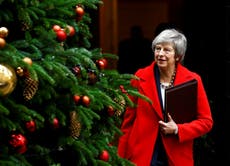MPs who support the Norway model are dodging the Brexit question – the people need a Final Say on Theresa May's deal
With more than 100 MPs critical of her deal, and 67 pledged to vote against it, the prime minister appears to be heading for a major defeat over her Brexit deal

Tuesday night’s landmark vote by MPs to take back control of the Brexit process might yet have a silver lining for Theresa May. The gloomiest faces at Westminster today are those of hardline Brexiteers. With MPs in the driving seat and now able to make proposals about what happens if May’s deal is sunk, Eurosceptic dreams of a “managed no deal” or no deal at all have finally died.
May’s warnings that rejecting her deal would mean a no-deal scenario already lacked credibility. She can now frame the choice for MPs as between her deal and no Brexit. That might persuade some Tory hardliners to hold their nose and vote for her agreement. I know some Tories who will reject it in next Tuesday’s vote but intend to back it in a second vote if May survives and wins cosmetic changes from the EU.
For now, however, that seems a long way off. With more than 100 MPs critical of her deal, and 67 pledged to vote against it, she appears to be heading for defeat by more than 100 votes. A few tweaks by Brussels would not salvage that.
So the race to become the official Plan B is now on between Norway-plus (staying in the single market and a customs union) and a Final Say referendum on the terms of the deal.
My soundings suggest that, at this stage, Norway is inching ahead. It might be too much for May to swallow as it would not end free movement, and so might have to be implemented by a new prime minister.
Several cabinet ministers like the Norway-plus plan championed by Tory backbencher Nick Boles, not least because they believe it has the best chance of any option of securing a Commons majority. And it would be acceptable to the EU: supporters argue it would honour the 2016 referendum as the UK would leave the EU in March (though Eurosceptics dispute that).
Business would back it because the transitional period would last from March until December 2020, when the UK would join the European Free Trade Association and remain in the European Economic Area (EEA). It would also prevent a hard Irish border.
For many MPs, the path to Norway is smoother than the one to a referendum, which they fear would be divisive and provoke a “yellow vest” backlash from voters angry that politicians had overturned the 2016 decision.
Some Tories have spotted another advantage to the Norway option: it would highlight Labour’s divisions. Some 75 Labour MPs defied Jeremy Corbyn by voting for a Norway-style deal in June. Some Labour insiders fear the figure could rise to more than 100 if May’s deal is rejected. “The EEA is a nightmare for us,” one said.
There are rumours that Corbyn might be tempted to allow his MPs a free vote on the Norway option to mask his party’s split. This might also spare him an agonising decision on whether to support a referendum.
Giving voters the Final Say is winning growing support in the shadow cabinet, but some of Corbyn’s closest allies fear that backing a referendum would alienate so many Labour Leavers in the north and midlands that the party could not win a general election. One Corbynista MP said: “We mustn’t jump the gun on a referendum.”
But Labour supporters of a referendum fear their chance will be missed unless Corbyn comes out for one sooner rather than later. Events will move quickly after next Tuesday’s vote; the momentum towards Norway-plus might become unstoppable.
The People’s Vote campaign will try to derail that this week by publishing a report highlighting the flaws in the Norway option: the UK would be a rule-taker rather than rule-maker; the Northern Ireland “backstop” would still be in the withdrawal agreement; trade deals with non-EU countries would be ruled out and there would be many more years of uncertainty.
Significantly, Labour MPs who once backed the EEA route have now come out against it in the report. Alison McGovern said: “Nick Boles and others pushing the EEA now should have voted for it when they had the chance. The more people know about Brexit, the more people are wanting the Final Say.”
Stephen Doughty said time had moved on since June, when he offered support for EEA. “There is no form of Brexit [that] can meet all the promises made, let alone the expectations created, in 2016. In these circumstances, the most democratic thing to do is to hand this decision back to the people so they can have the Final Say, rather than opting for a temporary port in the coming storm.”
And Bridget Phillipson said that under the Norway option, “the UK would lose our rights as an EU member – with less trade, fewer opportunities and lower living standards – and a loss of control over rules we would still have to follow. The better – and more realistic option at this late stage – would be to put the decision over whether to accept the government’s deal to the public in a people’s vote.”
These three MPs are right. Norway would merely postpone the UK’s final decision. Much better to give the people the Final Say now.



Join our commenting forum
Join thought-provoking conversations, follow other Independent readers and see their replies